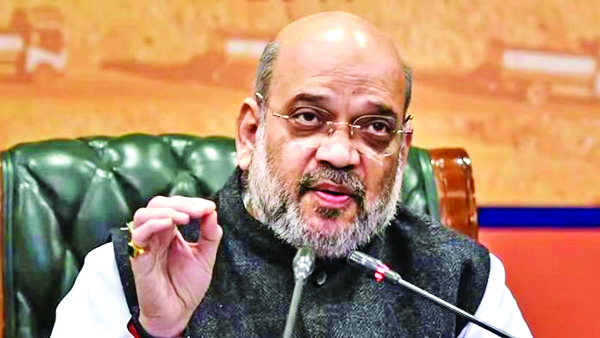DH NEWS SERVICE
New Delhi, Apr 14
Union Home Minister Amit Shah on Monday stated that the entire scenario of crime has changed and criminals are using advanced technology, information and communication tools, making crime borderless, and to stop such crimes use of forensic science is imperative.
Addressing the All India Forensic Science Summit 2025 organised by the National Forensic Sciences University (NFSU) here, Shah said, “Without forensic science, it is not possible to deliver timely justice and increase the rate of conviction”, a Home Ministry statement said.
He said that the entire scenario of crime has changed today. Now criminals use different means of technology, information and communication, due to which crime has now become borderless. Earlier, crime used to happen in a small part of a district, state or country, but now crime has become borderless.
“Modern crimes now transcend city, state, national, and even international boundaries. In such a situation, the importance of forensic science has increased a lot,” the Home Minister said.
Shah said that when Prime Minister Narendra Modi was the Chief Minister of Gujarat and he was the Home Minister, the seed of Gujarat Forensic Sciences University, planted by Narendra Modi in 2009, has now grown into a banyan tree in the form of the National Forensic Sciences University — the first university of its kind in the world.
He said that it is a matter of joy for him that when the National Forensic Sciences University was established on 1 October 2020, Narendra Modi was the Prime Minister and he was the Home Minister of the country.
The Home Minister said that PM Modi’s visionary leadership has brought significant transformation to the country’s criminal justice system.
He emphasised that a system has been established where neither the accused nor the complainant is subjected to injustice. To ensure this balance, integrating forensic science into the criminal justice process is essential. Shah highlighted that the steps taken in 2009 and 2020 to establish the Forensic Science University are not only producing skilled professionals but also paving the way for research across various fields.
The Home Minister underlined that following the directive of Modi to get rid the country of colonial-era laws, work on finalising new criminal laws was carried out between 2019 and 2024. He noted that extensive discussions during this period revealed the extent to which the outdated laws were harming India’s criminal justice system.
He emphasised that if laws are not updated in accordance with changing times, they become obsolete and irrelevant. Adding that the original intent of the old criminal laws was not to deliver justice to Indian citizens but to uphold British rule. In contrast, the three new criminal laws have been crafted by Indians, for the protection and justice of Indian citizens.
Shah said that this represents the most significant legal reform of the 21st century.
The Home Minister said that the new laws have formally defined e-documents and e-summons. The method of technology used is irrelevant as long as the law recognizes e-documents, and similarly, once people accept e-summons, the mode of delivery no longer matters.
He emphasised that technology has been integrated at every stage of the criminal justice process — from the crime scene to investigation, and through to the trial. Forensic investigation has been made mandatory for all crimes that carry a punishment of more than seven years. Shah expressed confidence that these changes will lead to India achieving the highest conviction rate in the world in the coming decade.
The Home Minister said that the conviction rate in the country currently stands at 54 percent. He said that terrorism has been defined in the new laws. Voice logs and digital voice mail have also been given a place. Arrangements have also been made in BNSS to give legal basis to audio, video recordings, videography of forensic evidence and digital records in interrogation.
He said that today 100 per cent police stations in the country have been computerized through Crime and Criminal Tracking Network and System (CCTNS).
“Due to the farsightedness of PM Modi, we had established the National Forensic Sciences University in the year 2020 itself, while three new criminal laws came into force in 2024. Seven campuses of the National Forensic Sciences University have been established in different states of the country.
Nine more campuses will be established in the next six months. Apart from these, the establishment of 10 more campuses is proposed,” Shah said.
The Home Minister acknowledged that the country faces numerous challenges, many of which can be addressed through the effective use of forensic science. He called for close collaboration between the Ministry of Home Affairs and the Forensic Sciences University to work toward building a crime-free society through scientific solutions.
Shah said that, during the conference, young individuals were recognized for their outstanding performance in the hackathon and their efforts to promote the use of the Hindi language.
On the occasion, the Home Minister also payed tribute to Babasaheb Dr Bhimrao Ambedkar on his birth anniversary, and said that Babasaheb worked to finalize the Constitution of India.



























